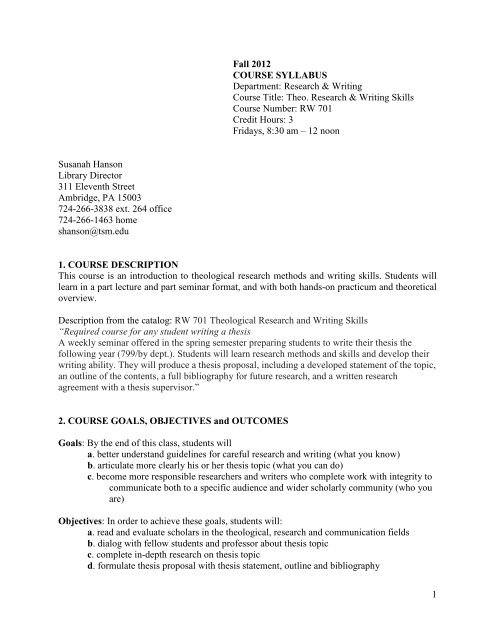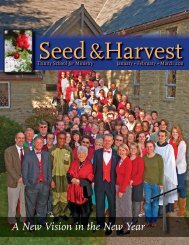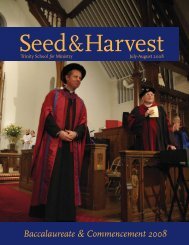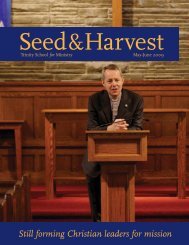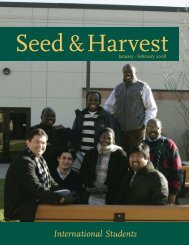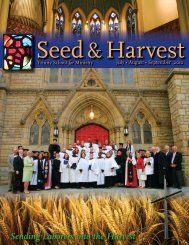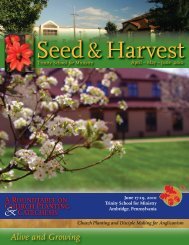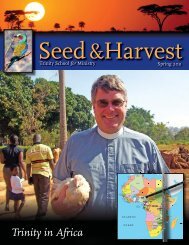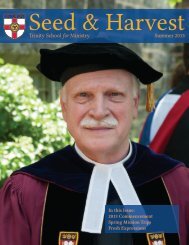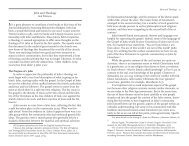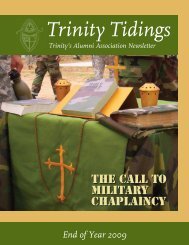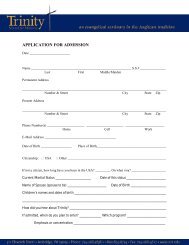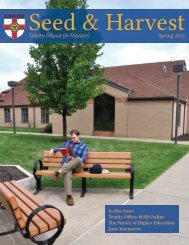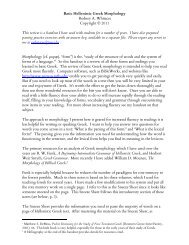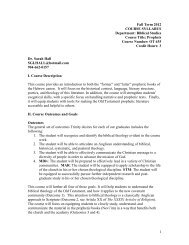1 Fall 2012 COURSE SYLLABUS Department: Research & Writing ...
1 Fall 2012 COURSE SYLLABUS Department: Research & Writing ...
1 Fall 2012 COURSE SYLLABUS Department: Research & Writing ...
Create successful ePaper yourself
Turn your PDF publications into a flip-book with our unique Google optimized e-Paper software.
<strong>Fall</strong> <strong>2012</strong><br />
<strong>COURSE</strong> <strong>SYLLABUS</strong><br />
<strong>Department</strong>: <strong>Research</strong> & <strong>Writing</strong><br />
Course Title: Theo. <strong>Research</strong> & <strong>Writing</strong> Skills<br />
Course Number: RW 701<br />
Credit Hours: 3<br />
Fridays, 8:30 am – 12 noon<br />
Susanah Hanson<br />
Library Director<br />
311 Eleventh Street<br />
Ambridge, PA 15003<br />
724-266-3838 ext. 264 office<br />
724-266-1463 home<br />
shanson@tsm.edu<br />
1. <strong>COURSE</strong> DESCRIPTION<br />
This course is an introduction to theological research methods and writing skills. Students will<br />
learn in a part lecture and part seminar format, and with both hands-on practicum and theoretical<br />
overview.<br />
Description from the catalog: RW 701 Theological <strong>Research</strong> and <strong>Writing</strong> Skills<br />
“Required course for any student writing a thesis<br />
A weekly seminar offered in the spring semester preparing students to write their thesis the<br />
following year (799/by dept.). Students will learn research methods and skills and develop their<br />
writing ability. They will produce a thesis proposal, including a developed statement of the topic,<br />
an outline of the contents, a full bibliography for future research, and a written research<br />
agreement with a thesis supervisor.”<br />
2. <strong>COURSE</strong> GOALS, OBJECTIVES and OUTCOMES<br />
Goals: By the end of this class, students will<br />
a. better understand guidelines for careful research and writing (what you know)<br />
b. articulate more clearly his or her thesis topic (what you can do)<br />
c. become more responsible researchers and writers who complete work with integrity to<br />
communicate both to a specific audience and wider scholarly community (who you<br />
are)<br />
Objectives: In order to achieve these goals, students will:<br />
a. read and evaluate scholars in the theological, research and communication fields<br />
b. dialog with fellow students and professor about thesis topic<br />
c. complete in-depth research on thesis topic<br />
d. formulate thesis proposal with thesis statement, outline and bibliography<br />
1
Outcomes: As a result of this class, students will:<br />
a. Be able to articulate a Biblical theology of theological research and writing;<br />
b. Be able to understand principles of research in the theological discipline, including<br />
literacy of information;<br />
c. Be able to fashion a research methodology tailored to the Master’s thesis project;<br />
d. Be able to demonstrate ability to apply correct bibliographic forms in the SBL style;<br />
e. Learn the art and craft of theological bibliography.<br />
The learning outcomes for Trinity School for Ministry are attached to the end of this<br />
syllabus and should be referred to for further information.<br />
This course will particularly focus on the MAR Learning Outcomes numbers (2) with students<br />
articulating “an Anglican understanding of biblical, historical, systematic and pastoral theology”<br />
as it applies to one’s specific thesis topic; and (4) also being “equipped to apply scholarship to<br />
the life of the church in his or her chosen theological discipline.”<br />
3. <strong>COURSE</strong> TEXTS<br />
A. Primary texts (these texts are required to be read in their entirety):<br />
Graff, Gerald and Cathy Birkenstein. They Say I Say: the moves that matter in academic<br />
writing. 2 nd ed. New York: W.W. Norton, 2009. ISBN: 9780393933611. $16.50<br />
Strunk, William and E.B. White The Elements of Style, 4 th edition, Boston, Allyn and<br />
Bacon, 2000. ISBN 978-02053-09023 $9.95 paperback (in stock at bookstore)<br />
Vyhmeister, Nancy Your Guide to <strong>Writing</strong> Quality <strong>Research</strong> Papers for Students of<br />
Religion and Theology, 2 nd ed. Grand Rapids, Zondervan Publishing, 2008. ISBN<br />
9780310274407. $16.99<br />
B. Supplementary texts (students need not purchase these items):<br />
Alexander, Patrick, et al Eds. SBL Handbook of Style: for Ancient Near Eastern, Biblical,<br />
and Early Christian Studies. Peabody, MA: Hendrickson, 1999. ISBN 9781565634879<br />
Badke, William B. <strong>Research</strong> Strategies: finding your way through the information fog. 4 th<br />
Edition. Bloomington, IN: IUniverse, Inc., 2011.<br />
Booth, William E., Gregory G. Colomb and Joseph M. Williams. The Craft of <strong>Research</strong>.<br />
3 rd Edition. Chicago: University of Chicago Press, 2008. ISBN 9780226065663<br />
2
Leedy, Paul, Practical <strong>Research</strong>: Planning and Design, 8 th edition. Upper Saddle River,<br />
NJ: Merrill, 2004<br />
Lewis, C. S. “Learning in War Time.” The Weight of Glory and Other Essays. New York,<br />
Macmillan Co, 1949.<br />
Orwell, George. “Politics and the English Language.” First published Horizon April<br />
1946. http://www.orwell.ru/library/essays/politics/english/e_polit<br />
Nogalski, Melanie Greer et al. Student Supplement for the SBL Handbook of Style.<br />
Revised. 2009. http://www.sbl-site.org/assets/pdfs/SBLHSrevised2_09.pdf<br />
Warfield, Benjamin Brekinridge. The Religious Life of Theological Students. Presbyterian<br />
and Reformed Publishing Co, 1911.<br />
All texts will be on the reserve shelf in the library<br />
4. <strong>COURSE</strong> REQUIREMENTS<br />
A. Preliminary to the course:<br />
• Students should have begun research and reading in their thesis interest area, with<br />
a general goal of reading about 500 pages in the general topic area before the first<br />
day of class.<br />
• Students should come to class with a working preliminary thesis statement in<br />
mind.<br />
B. Students are expected to spend two hours outside of class in preparation for course<br />
assignments and class discussion for every hour the class meets;<br />
C. Students are expected to attend class and to comply with student academic policies (for<br />
instance, chapel attendance, intellectual honesty, and thesis process).<br />
D. Readings during the course: See schedule below<br />
E. Weekly Assignments: See schedule below<br />
There will be weekly assignments to foster classroom discussion, and to help<br />
prepare the student for submitting the four course submission requirements listed<br />
below.<br />
3
F. Thesis Proposal Requirements:<br />
(items are to be turned in by the end of class on December 14, <strong>2012</strong>)<br />
1. Thesis statement.<br />
2. Thesis project overview.<br />
3. Working outline.<br />
4. Working bibliography.<br />
5. <strong>COURSE</strong> EVALUATION<br />
Grading is determined on a pass/fail basis. Pass is awarded for turning in all completed<br />
assignments and attendance for the in-class sessions. No credit will be given unless all<br />
assignments are completed adequately.<br />
6. <strong>COURSE</strong> STRUCTURE<br />
I. Introduction to class<br />
a. Overview of syllabus & assignments<br />
b. Students’ description of projects<br />
II.<br />
III.<br />
Theory<br />
a. Study to show oneself approved<br />
b. Lewis<br />
c. Warfield<br />
<strong>Research</strong><br />
a. Foundations<br />
i. FOCUS<br />
ii. Thesis Statement<br />
iii. Outlines<br />
iv. Intellectual Honesty<br />
b. Practical outworkings<br />
i. Print materials<br />
1. Encyclopedias<br />
2. Grazing in stacks<br />
3. Paper indexes<br />
4
ii. E-resources (with Boolean logic)<br />
1. Trinity online Catalog<br />
2. Worldcat.org<br />
3. EBSCO databases<br />
4. Ad Fontes<br />
5. BibleWorks<br />
c. Evaluating sources<br />
i. Evaluating arguments - They Say/I Say<br />
ii. Evaluating print resources<br />
iii. Evaluating web resources<br />
IV.<br />
<strong>Writing</strong><br />
a. Basics of writing<br />
i. Orwell<br />
ii. Strunk & White<br />
b. Revisiting They Say/I Say<br />
c. Bibliographies<br />
i. SBL Style<br />
ii. Zotero<br />
V. Bringing it all together – Thesis Proposal<br />
5
Please note that this is a DRAFT schedule and is subject to change, based on class size and<br />
needs.<br />
Date Subject Readings Assignment Due<br />
9-7-12 Introduction to class<br />
Description of projects<br />
Search & Seize<br />
9-14-12 Lewis & Warfield Discussion<br />
Lewis Article<br />
Search & Seize<br />
Search & Seize review<br />
Thesis Statements<br />
Progress reports<br />
Warfield Article<br />
9-21-12 <strong>Research</strong> Foundations<br />
Vyhmeister<br />
Sample thesis statements<br />
How To: Write a Book Review<br />
Progress reports<br />
9-28-12 <strong>Research</strong> Principles<br />
Vyhmeister<br />
Vyhmeister Book Review<br />
Vyhmeister Discussion<br />
Print Materials<br />
Progress Reports<br />
10-5-12 Database Essentials<br />
Reading in Subject Area Revised Thesis Statements<br />
Database Presentations<br />
Progress Reports<br />
10-12-12 Draft Outline Discussion<br />
Reading in Subject Area Draft Outlines<br />
BibleWorks presentation<br />
Progress Reports<br />
10-19-12 No Class – Reading Week<br />
10-26-12 Evaluating Sources<br />
They Say/I Say Discussion<br />
They Say/I Say<br />
They Say/I Say Book<br />
Review<br />
Progress reports<br />
11-2-12 Annotated Bibliography Discussion Reading in Subject Area Annotated Bibliographies<br />
Weighing Sources<br />
<strong>Research</strong> Design<br />
Progress Reports<br />
11-9-12 Basics of <strong>Writing</strong>/<strong>Writing</strong> Tips<br />
Reading in Subject Area Revised thesis statement<br />
Revisiting They Say/I Say<br />
Progress Reports<br />
Orwell article<br />
Strunk & White<br />
11-16-12 Zotero Overview Reading in Subject Area<br />
6
SBL Overview<br />
Progress reports<br />
11-23-12 No Class – Thanksgiving Break<br />
11-30-12 Project Presentations Presentation & Handouts*<br />
12-7-12 Project presentations Presentation & Handouts*<br />
12-14-12 Project presentations<br />
Class wrap-up<br />
Thesis Proposals Due<br />
Presentations &<br />
Handouts*<br />
*A note about final presentations. Please prepare for these as if you were presenting the information to<br />
the class for the first time. This is a great time to use visual aids, practice your “elevator speech,” or<br />
otherwise elaborate on introductory material (for example, talking about why the subject interests you,<br />
and when your interest began). If it is helpful, think about designing this presentation with an adult<br />
Sunday School class in mind.<br />
7. <strong>COURSE</strong> CONTACTS<br />
I am usually in my office in the library from 9 am until 5 pm, Monday, Tuesday, Thursday and<br />
Friday (I’m around campus on Wednesdays, but often occupied with meetings). Please feel free<br />
to stop by my office any time. If you need more than a few minutes, it might be best to contact<br />
me first to set up a specific time for meeting. Email is also a good way to get in touch with me:<br />
shanson@tsm.edu<br />
8. ADDENDUM for STM STUDENTS<br />
STM Students will complete the above assignments, and will complete three additional projects:<br />
• Read William B. Badke’s book <strong>Research</strong> Strategies: finding your way through the<br />
information fog, 3 rd edition, and prepare materials for a half-hour teaching based on the<br />
book. Materials could include a teaching outline, a powerpoint presentation or a handout<br />
designed for class use.<br />
• Prepare a more extensive Thesis Proposal including a 5-page overview of their thesis<br />
topic.<br />
• In addition, STM students should complete a more extensive bibliography, incorporating<br />
the use of non-English materials as specified by their degree requirements.<br />
Last Updated: 8 August <strong>2012</strong><br />
7
Learning Outcomes by Degree<br />
(current as of 11/30/2011)<br />
MDiv<br />
1. The student will recognize and identify the biblical theology evident in the course work.<br />
2. The student will be able to articulate an Anglican understanding of biblical, historical,<br />
systematic and pastoral theology.<br />
3. The student will be able to communicate effectively the Christian message to a diversity of<br />
people in order to advance the mission of God.<br />
4. The student will be prepared to effectively lead in a variety of Christian communities.<br />
MAR<br />
1. The student will recognize and identify the biblical theology evident in the course work.<br />
2. The student will be able to articulate an Anglican understanding of biblical, historical,<br />
systematic and pastoral theology.<br />
3. The student will be able to effectively teach the Christian faith.<br />
4. The student will be equipped to apply scholarship to the life of the church in his or her<br />
chosen theological discipline.<br />
STM<br />
1. The student will recognize and identify the biblical theology evident in the course work.<br />
2. The student will be able to articulate an Anglican understanding of biblical, historical,<br />
systematic and pastoral theology.<br />
3. The student will demonstrate the ability to carry out research from original sources.<br />
4. The student will be equipped to successfully pursue further independent research and postgraduate<br />
study in his or her chosen theological discipline.<br />
DMin<br />
1. The student will recognize and identify the biblical theology evident in the course work.<br />
2. The student will be able to identify and articulate a distinct ministry problem.<br />
3. The student will demonstrate the ability to reflect biblically and theologically about the<br />
identifed problem.<br />
4. The student will demonstrate the ability to apply the learnings from the biblical and<br />
theological reflections to the identified problem.<br />
8


